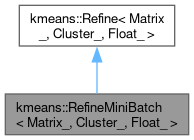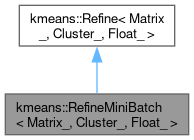Implements the mini-batch algorithm for k-means clustering. More...
#include <RefineMiniBatch.hpp>


Public Member Functions | |
| RefineMiniBatch (RefineMiniBatchOptions options) | |
| RefineMiniBatch ()=default | |
| RefineMiniBatchOptions & | get_options () |
 Public Member Functions inherited from kmeans::Refine< Index_, Data_, Cluster_, Float_, Matrix_ > Public Member Functions inherited from kmeans::Refine< Index_, Data_, Cluster_, Float_, Matrix_ > | |
| virtual Details< Index_ > | run (const Matrix_ &data, Cluster_ num_centers, Float_ *centers, Cluster_ *clusters) const =0 |
Detailed Description
class kmeans::RefineMiniBatch< Index_, Data_, Cluster_, Float_, Matrix_ >
Implements the mini-batch algorithm for k-means clustering.
The mini-batch approach is similar to Lloyd's algorithm in that it runs through a set of observations, assigns each to the closest centroid, updates the centroids and repeats. The key difference is that each iteration is performed with a random subset of observations (i.e., a "mini-batch"), instead of the full set of observations. This reduces computational time and memory usage at the cost of some solution quality.
The update procedure for a cluster's centroid involves adjusting the coordinates by the assigned observations in the mini-batch. The resulting vector can be interpreted as the mean of all observations that have ever been sampled (possibly multiple times) to that cluster. Thus, the magnitude of the updates will decrease in later iterations as the relative effect of newly sampled points is reduced. This ensures that the centroids will stabilize at a sufficiently large number of iterations.
We may stop the algorithm before the maximum number of iterations if only a few observations are reassigned at each iteration. Specifically, every \(h\) iterations, we compute the proportion of sampled observations for each cluster in the past \(h\) mini-batches that were reassigned to/from that cluster. If this proportion is less than some threshold \(p\) for all clusters, we consider that the algorithm has converged.
In the Details::status returned by run(), the status code is either 0 (success) or 2 (maximum iterations reached without convergence). Previous versions of the library would report a status code of 1 upon encountering an empty cluster, but these are now just ignored.
- Template Parameters
-
Index_ Integer type of the observation indices. This should be the same as the index type of Matrix_.Data_ Numeric type of the input dataset. This should be the same as the data type of Matrix_.Cluster_ Integer type of the cluster assignments. Float_ Floating-point type of the centroids. This will also be used for the internal distance calculations. Matrix_ Class satisfying the Matrixinterface.
Constructor & Destructor Documentation
◆ RefineMiniBatch() [1/2]
|
inline |
- Parameters
-
options Further options for the mini-batch algorithm.
◆ RefineMiniBatch() [2/2]
|
default |
Default constructor.
Member Function Documentation
◆ get_options()
|
inline |
- Returns
- Options for mini-batch partitioning. This can be modified prior to calling
run().
The documentation for this class was generated from the following file:
- kmeans/RefineMiniBatch.hpp
Generated by